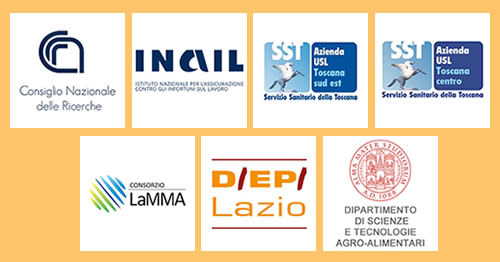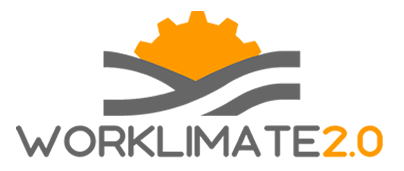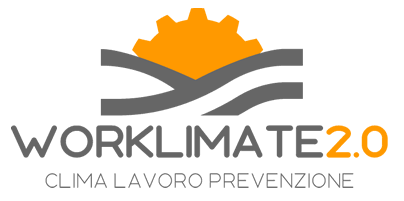The project
WORKLIMATE 2.0 – Extreme temperatures and impacts on occupational health, safety and productivity: intervention strategies, information, training and technological solutions.
Abstract
The main project goalgeneral is to enhance and deepen the knowledge on the impacts of extreme temperatures on occupational health, safety and productivity, improving and implementing tools and intervention strategies already available and dedicated to specific work sectors. The project also aims to developnew technological solutions and information tools to improve risk prevention and management in companies, for the benefit of workers, employers and prevention professionals (Prevention and Protection Service Managers, Territorial Workers Safety Representative, Employers and Occupational Physicians) .
The duration of the Project is 2 years (the project started on 15 May 2023).
Institutional Recipient (DI) Proponent:
National Research Council – Institute for BioEconomy (IBE).
SCIENTIFIC RESPONSIBLE: Morabito Marco
Institution of affiliation: National Research Council – Institute for BioEconomy (IBE)
Internal Operational Unit of the INAIL Research Department
Department of Medicine, Epidemiology, Occupational and Environmental Hygiene. Laboratory of Occupational and Environmental Epidemiology.
Responsible Alessandro Marinaccio and Michela Bonafede.
Project institutions and lead partners involved
- National Research Council – Institute for BioEconomy (IBE) –Marco Morabito
- Azienda USL Toscana Centro – UFC Epidemiologia-UFS CeRIMP of the Department of Prevention (Florence) –Miram Levi and Donatella Talini
- Azienda USL Toscana Sud Est – Physical Agents Public Health Laboratory – (Siena) –Andrea Bogi
- Department of Epidemiology, Lazio Regional Health Service\ASL Roma 1 (DIPEPI) (Rome) – Paola Michelozzi and Francesca de’Donato
- LaMMA Consortium – Laboratory for Environmental Monitoring and Modelling for Sustainable Development (Sesto Fiorentino, Florence) – Bernardo Gozzini and Daniele Grifoni
- Department of Agricultural and Food Sciences and Technologies (DISTAL) University of Bologna (Bologna) – Daniele Viaggi and Stefano Targetti
The Project is organized into 6 Work Packages and divided into several tasks and activities:
blank
Work Package 1: Epidemiological and economic analysis relating to the estimation of social and business costs related to extreme temperatures.
- Overview and update of the literature relating to insurance costs related to injuries related to exposure at extreme temperatures.
- Estimation of costs and work productivity through the organization of case studies conducted mainly in hot (but also cold) environments.
- Characterization of individual vulnerability factors to heat using the Rome longitudinal cohort connected with INPS data to estimate the acute (short-term) effects of exposure to heat and risk of accidents, considering previous pathologies and socio-economic individual characteristics
Work Package 2: Perception and knowledge of the risk linked to extreme temperatures in different work sectors, meteorological and physiological monitoring in selected companies and identification and characterization of the effectiveness of wearable technologies in relation to the prevention of thermal risk.
- Expansion of the sample and revision of the questionnaire for the administration of the “Hot and Work” survey on the perception and knowledge of heat risk. Design and administration of the “Cold and Work” questionnaire.
- Organization of case studies in selected companies aimed at weather and climate monitoring integrated with thermal analyzes of the surfaces present in the company and physiological monitoring of workers during working hours on specific days identified as potentially at risk.
- Characterization of some wearable technological solutions (ventilated clothing, coolers, etc.) in the laboratory (climate chamber) and subsequently in the field (companies), evaluating their effectiveness and developing protocols for correct use.
Work Package 3: Estimation of productivity loss based on weather-climate monitoring and development of an information tool useful to companies for work planning.
- Retrospective analysis of the potential loss of productivity using estimation functions based on weather-climatic data spatialized across the entire national territory.
- Development of a WebGIS information tool aimed at estimating productivity loss at various times of the year depending on the geographical area and various exposure scenarios.
Work Package 4: Implementation of a heat warning system specific for the employment sector also integrated with a prototype of a cold warning system.
- Implementation of the heat risk forecast web platform available to all workers and workplace safety officers and development of a prototype warning system to also predict the effects of cold.
- Optimization of the “WORKLIMATE” WebApp for personalized heat risk forecasts available exclusively for employers and all workplace safety professionals.
- Evaluation of the effectiveness of the forecasting system
Work Package 5: Training/information aimed at employers implemented by the design and development of serious games (corporate video games).
- Development of a coordinated program between various companies aimed to the head safety workers training that is on the risks associated with the management of extreme temperatures and reorganization and implementation of the “heat and work report” by expanding the repository for collecting information from newspapers with the objective of creating an observatory of events attributable to critical thermal conditions in the occupational sector.
- Creation of a serious game on hot risk which will allow both an increase in the engagement of the target involved and an effective transfer of content and indications relating to the management of this kind of risk.
- Development and implementation of training modules in the companies involved in the project and development of information material and recommendations for specific sectors aimed at workers and employers.
Work Package 6: Results and scientific dissemination.
- Request for approval of the research activity by the CNR ethics committee and realization of the project website and logo.
- Integration of the main knowledge acquired and the most relevant project outputs on the Physical Agents Portal website and in a dedicated section of the INAIL institutional website.
- Publications and participation in conferences/seminars.
- Organization of dissemination and information events to illustrate the project results.
work group
Gennaro Albini, Filippo Ariani, Alessandra Binazzi, Andrea Bogi, Michela Bonafede, Raimondo Buccelli, Alfonso Crisci, Francesca de’Donato, Fabio De Francesco, Simona Del Ferraro, Pina Galzerano, Claudio Gariazzo, Rino Ghelfi, Claudia Giliberti, Bernardo Gozzini, Valentina Grasso, Daniele Grifoni, Giulia Guerri, Emanuela Giuli, Giulia Ionita, Miriam Levi, Alessandro Marinaccio, Agnese Martini, Alessandro Messeri, Paola Michelozzi, Vincenzo Molinaro, Stefano Monti, Marco Morabito, Antonio Moschetto, Francesco Pasi, Francesco Picciolo, Emma Pietrafesa, Meri Raggi, Nicola Stacchini, Edvige Sorrentino, Donatella Talini, Stefano Targetti, Daniele Viaggi
partners



